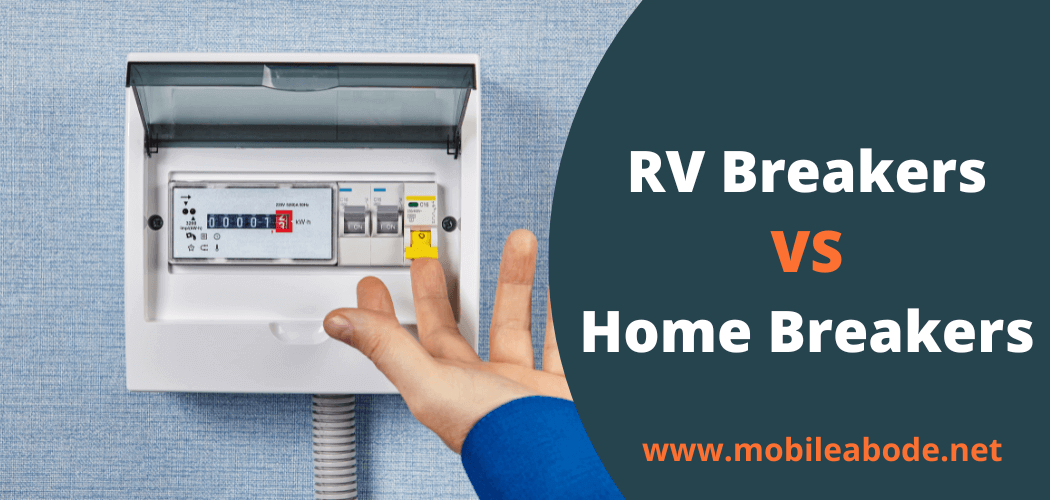There are many important decisions to make when purchasing or renovating a mobile home, and one of the most important is what type of breakers to use.
Some people mistakenly believe that RV breakers are the same as regular home breakers, but this is not always the case. There can be some major differences between these two types of breakers.
In this post, we’re going to take a look at the difference between RV breakers and home breakers, and explore which one might be a better option for you. So, read on to learn more!
RV breakers VS home breakers
When it comes to mobile homes, two main types of breakers can be used
- RV breakers
- Home breakers.
RV breakers are typically used in recreational vehicles. They work by monitoring the power usage of different appliances and devices on the RV and then shutting off the power when it reaches a certain threshold. This prevents overloading the RV’s electrical system and keeps everyone safe.
Home breakers work similarly, but they’re installed in your home’s electrical panel instead of an RV. They monitor the overall power usage of your home and shut off the power when it reaches a certain threshold. This protects your home from short circuits or overloads that could cause serious damage.
Home breakers can be more difficult to install, and they may not offer the same level of durability as RV breakers. Home breaker sizes are usually 15, 20, or 30 amps. Additionally, home breakers can be more expensive than RV breakers, which is something to keep in mind if you’re on a tight budget.
Both RV breakers and home breakers have their pros and cons, so you’ll need to decide which is right for you. If you’re not sure, it’s always best to consult with a professional electrician.
How are RV breakers different from home breakers?
RV breakers are specifically designed for RVs, and they offer some benefits that regular home breakers don’t. For one, RV breakers are often easier to install, as they don’t require any special wiring.
RV breakers are a great way to power your RV without having to worry about tripping a breaker in your home.
What’s more, RV breakers are typically more durable and weather-resistant, making them a good option for those who live in areas with extreme temperatures or severe weather conditions.
RV breakers come in two types: 20 and 50 amp. You need to make sure you have the right RV breaker for your needs. When selecting an RV breaker, make sure that it is UL listed.
So, which type of breaker is right for you?
The answer to this question depends on several factors, including your budget, the climate you live in, and your personal preferences.
If you’re on a tight budget, then RV breakers are probably the way to go. However, if you’re looking for a more durable option that can withstand extreme weather conditions, then home breakers might be a better choice.
Ultimately, the decision of which type of breaker to use is up to you. Just be sure to do your research and choose the option that best suits your needs.
Are there any special considerations when installing RV breakers in your home?
When installing RV breakers in your home, there are a few things you need to keep in mind.
- First, make sure that the area where you’re going to install the breaker is clean and dry.
- Next, you’ll need to connect the breaker to the main power supply.
- Be sure to follow all instructions carefully, and always use caution when working with electricity.
If you’re not comfortable doing the installation yourself, then it’s best to hire a professional electrician to do it for you.
Also Read: Why Is The Mobile Home Electric Bill So High?
What are the benefits of using an RV breaker in your home?
There are several benefits to using an RV breaker in your home.
- RV breakers are typically easier to install than regular home breakers.
- They’re usually more durable and weather-resistant, making them a good choice for those who live in areas with extreme temperatures or severe weather conditions.
- RV breakers can be less expensive than home breakers, which is something to keep in mind if you’re on a tight budget.
So, if you’re looking for an easy-to-install, durable, and affordable breaker for your home, then an RV breaker is a great option.
Final Words:
RVs have many different breakers than regular homes. The most important difference is that the RV breakers are reset by turning off the main breaker, while home breakers are reset by flipping the switch on each breaker.
This can be dangerous if you’re not familiar with how to reset them! To avoid any accidents, it’s best to label which breaker is for what before you start using your RV and check you your RV electrical service requirements.
RV breaker panels have more breakers and a different layout than home breaker panels. If you are trying to wire something in your RV, make sure you are using the right breaker. It is important to know how to use the RV breaker panel because it can protect your appliances and electronics while you are on the road.
It is important to know the size of your RV breaker before you purchase an RV surge protector. A surge protector will not work if it is larger than the RV breaker size. If you have a smaller RV breaker (20 amp), you should use a 20 amp surge protector. If you have a larger RV breaker (30 amp), you should use a 30 amp surge protector.

